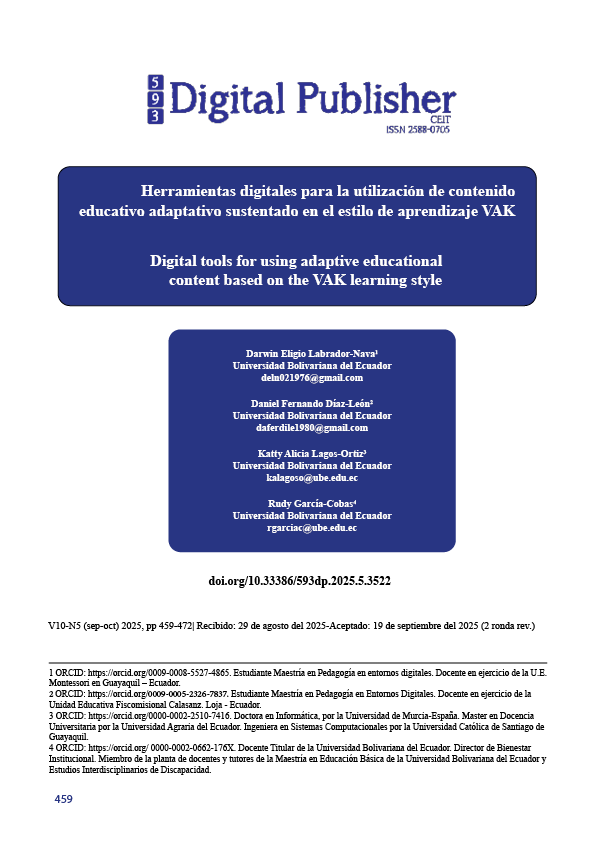Digital tools for using adaptive educational content based on the VAK learning style
Main Article Content
Abstract
This research analyzed the relationship between visual, auditory, and kinesthetic (VAK) learning styles, the use of digital tools, and adaptive educational content among second-year high school students at the Calasanz Fiscomisional Educational Unit. Using a quantitative approach, the Visual, Auditory, and Kinesthetic questionnaire and a Likert-type survey were applied to identify predominant learning styles and evaluate perceptions of the use of digital resources. The results revealed that, although there is a diversity of styles, the visual style is highly valued in activities such as memorization, problem-solving, content presentation, and individual study. Likewise, there was widespread acceptance of interactive platforms, educational videos, and mobile applications, which promote student comprehension and motivation. The correlation between visual style and the use of digital tools proved to be significant, reinforcing the need to incorporate visual and interactive materials into teaching practices. However, limitations in the systematic adaptation of digital content to individual preferences were also identified, suggesting opportunities for improvement in teacher training and instructional design. In conclusion, the importance of planning educational strategies that integrate adaptive technologies and respond to students' learning styles was highlighted, promoting more inclusive, personalized, and effective teaching.
Downloads
Article Details

This work is licensed under a Creative Commons Attribution-NonCommercial-ShareAlike 4.0 International License.
1. Derechos de autor
Las obras que se publican en 593 Digital Publisher CEIT están sujetas a los siguientes términos:
1.1. 593 Digital Publisher CEIT, conserva los derechos patrimoniales (copyright) de las obras publicadas, favorece y permite la reutilización de las mismas bajo la licencia Licencia Creative Commons 4.0 de Reconocimiento-NoComercial-CompartirIgual 4.0, por lo cual se pueden copiar, usar, difundir, transmitir y exponer públicamente, siempre que:
1.1.a. Se cite la autoría y fuente original de su publicación (revista, editorial, URL).
1.1.b. No se usen para fines comerciales u onerosos.
1.1.c. Se mencione la existencia y especificaciones de esta licencia de uso.
References
Asamblea Nacional Constituyente de Ecuador. (20 de Octubre de 2008). Constitución de la República del Ecuador 2008. Carta magna. Quito, Pichincha, Ecuador: Asamblea Nacional. https://www.defensa.gob.ec/wp-content/uploads/downloads/2021/02/Constitucion-de-la-Republica-del-Ecuador_act_ene-2021.pdf
Bravo, F. y Riofrío, E. (2024). Clases constructivistas de Geometría. Revista Científica UISRAEL, 11(2), 159-172. 10.35290/rcui.v11n2.2024.1082
Concha, J., Quispe, M. y Quispe, M. (2023). Importancia del uso de las herramientas digitales en la inclusión educativa. Revista de Investigación en Ciencias de la Educación,, 7(29), 1374 - 1386. 10.33996/revistahorizontes.v7i29.598
Díaz-Colpas, K. J. (2022). Modelo VAK: una estrategia para la enseñanza-aprendizaje de la lengua inglesa en estudiantes de cuarto grado. Revista Unimar, 240-259. 10.31948/Rev.unimar/unimar40-2-art11
Enríquez, L. y Navarro, J. (2024). Explorar los matices: aprendizaje personalizado y adaptativo en la educación digital. Revista Digital Universitaria, 25(1), 1-20. http://doi.org/10.22201/cuaieed.16076079e.2024.25.1.10
Fernandez-Liporace, M., Freiberg-Hoffmann, A. y Uriel , F. (2022). ¿ Cómo aprenden los estudiantes de educación secundaria y universitaria? Un análisis integral desde los estilos de aprendizaje. Avances en Psicología Latinoamericana, 40(3). 10.12804/revistas.urosario.edu.co/apl/a.10980
Ferrer, E. (2022). La variabilidad neuronal y el diseño universal para el aprendizaje (DUA). Journal of Neuroeducation, 3(1), 9-16. https://doi.org/10.1344/joned.v3i1.38611
Garcia, M. (2022). La Innovacion educativa como elemento transformador para enseñanza en la Unidad Educativa Augusto Solorzano Hoyos. Educare, 26(2), 310-330. 10.46498
Gunawardena, B. (2024). The simple, the complicated, the complex and the chaotic. Teaching and teacher Education. Personalized learning, 139. 10.1016/j.tate.2023.104429
Marín, R. (2020). Innovación y tecnología educativa en el contexto actual latinoamericano. Revista de Ciencias Sociales, 460-472. https://dialnet.unirioja.es/servlet/articulo?codigo=7599957
Ministerio de Educación del Ecuador. (2011). Ley Orgánica de Educación Intercultural. https://educacion.gob.ec/wp-content/uploads/downloads/2017/02/Ley_Organica_de_Educacion_Intercultural_LOEI_codificado.pdf
Pacheco, E., Yauli, P., Vera, E. y Villamar, K. (2025). La influencia de la plataforma virtual Meet en los estilos de aprendizaje en los estudiantes. Ciencia y Educación, 432-440. 10.5281/zenodo.15468875
Rivas, D., Rivera, G., Lagos, K. y Delgado, M. (2025). Entornos virtuales de aprendizaje (EVA) y su incidencia en la motivación de los estudiantes. MQRInvestigar, 9(2), 1-22. https://doi.org/10.56048/MQR20225.9.2.2025.e494
Rosero, M., Delgado, D., Ruano, M. y Criollo, C. (2021). Actitud docente frente a la educación inclusiva de estudiantes con discapacidad intelectual. 39(1), 96-106. https://doi.org/10.31948/Rev.unimar/unimar39-1-art7
Zambrano, E. M. y Molina, P. (2022). Aprendizaje visual y su repercusión en el rendimiento académico. Cognosis, 7(EE4), 65-74. https://revistas.utm.edu.ec/index.php/Cognosis/article/view/3072





